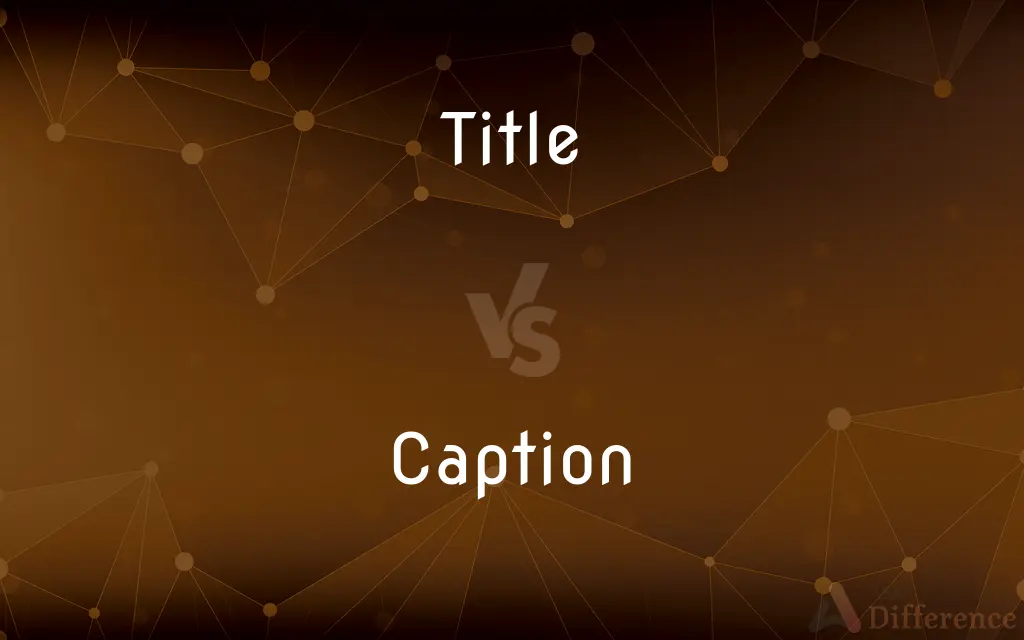Title vs. Caption — What's the Difference?
By Fiza Rafique & Maham Liaqat — Updated on March 16, 2024
A title is a name or heading given to something, like a book or artwork, to reflect its theme or content. A caption is a brief explanation or description accompanying an image or illustration.

Difference Between Title and Caption
Table of Contents
ADVERTISEMENT
Key Differences
A title serves as the primary identifier for a piece of work, such as a book, article, painting, or movie. It is designed to be eye-catching and reflective of the content, theme, or main message of the work. Captions, on the other hand, are used to provide context or additional information for an image, photograph, or illustration. They are typically found directly beneath or adjacent to the image and are intended to explain, describe, or comment on the visual content, offering clarity or further insight into the image's relevance or meaning.
While titles are fundamental to the identity of a work and remain constant, captions can vary depending on the context in which the image is used. The same image might have different captions in different publications or settings, depending on what aspect of the image is being emphasized or how it relates to the surrounding content.
Titles can stand alone as a representation of the work and do not necessarily require additional context to be understood, though they may be open to interpretation. Captions, however, are usually directly related to the visual content they accompany and are designed to be read in conjunction with viewing the image.
Both titles and captions play crucial roles in communication, whether in art, literature, journalism, or online content. Titles help to establish the initial connection and interest, while captions provide depth and context, enhancing the audience's understanding and engagement with the visual material.
Comparison Chart
Purpose
Identifies and reflects the theme of a work.
Provides context or explanation for an image.
ADVERTISEMENT
Location
At the beginning or top of a work.
Near or beneath an image or illustration.
Function
Engages and intrigues the audience.
Explains and enhances understanding.
Variability
Remains constant for a work.
Can vary based on context or usage.
Relation
Represents the work as a whole.
Directly related to specific visual content.
Compare with Definitions
Title
The name given to a work of art, book, composition, or other creative work.
The novel's title, To Kill a Mockingbird, hints at its deeper themes.
Caption
A brief description or explanation accompanying an image or illustration.
The photo's caption explained the context of the historic event depicted.
Title
Serves as a summary or an introduction to the theme or subject.
The title The Starry Night immediately evokes the painting's imagery.
Caption
Enhances the viewer's understanding and appreciation of the image.
The detailed caption helped viewers understand the complex artwork.
Title
Can be creative, metaphorical, or literal, depending on the work.
The title Pride and Prejudice reflects the central themes of the novel.
Caption
Can include attribution, crediting the source or creator of the image.
The caption credited the photographer and the date the photo was taken.
Title
Aids in branding and marketing, making the work recognizable.
The movie title Jurassic Park became iconic and widely recognized.
Caption
Provides specific information about the visual content, such as time, place, or significance.
The caption under the painting detailed the artist's inspiration and the painting's background.
Title
Can include subtitles for additional context or clarification.
The Plant-Based Way to Health includes a subtitle explaining its focus.
Caption
May contain commentary, adding the author's or publisher's perspective.
The caption added a humorous remark, adding another layer to the image's interpretation.
Title
A title is one or more words used before or after a person's name, in certain contexts. It may signify either generation, an official position, or a professional or academic qualification.
Caption
A title, short explanation, or description accompanying an illustration or a photograph.
Title
The name of a book, composition, or other artistic work
The author and title of the book
Caption
A series of words superimposed on the bottom of television or motion picture frames that communicate dialogue to the hearing-impaired or translate foreign dialogue.
Title
A name that describes someone's position or job
Leese assumed the title of director general
Caption
A title or heading, as of a document or article.
Title
The position of being the champion of a major sports competition
Davis won the world title for the first time in 1981
Caption
(Law) The heading of a pleading or other document that identifies the parties, court, term, and number of the action.
Title
A right or claim to the ownership of property or to a rank or throne
The buyer acquires a good title to the goods
A grocery family had title to the property
Caption
To furnish a caption for.
Title
(in church use) a fixed sphere of work and source of income as a condition for ordination.
Caption
(typography) The descriptive heading or title, of a document or part thereof.
Title
Give a name to (a book, composition, or other work)
A report titled The Lost Land
Caption
A title or brief explanation attached to an illustration, cartoon, user interface element, etc.
Title
An identifying name given to a book, play, film, musical composition, or other work.
Caption
A piece of text appearing on screen as a subtitle or other part of a film or broadcast, describing dialogue (and sometimes other sound) for viewers who cannot hear.
Title
A general or descriptive heading, as of a book chapter.
Caption
(legal) The section on an official paper (for example, as part of a seizure or capture) that describes when, where, and what was taken, found or executed, and who authorized the act.
Title
A written work that is published or about to be published
The titles in the publisher's fall catalog.
Caption
A seizure or capture, especially of tangible property (chattel).
Title
A division of a legal code, generally consisting of multiple related statutes.
Caption
To add captions to a text or illustration.
Only once the drawing is done will the letterer caption it.
Title
Often titles Written material to be read by viewers that is included in a film or television show, typically presenting credits, narration, or dialogue.
Caption
To add captions to a film or broadcast.
Title
A written piece of translated dialogue superimposed at the bottom of the frame during a film; a subtitle.
Caption
A caviling; a sophism.
This doctrine is for caption and contradiction.
Title
A formal appellation attached to the name of a person as a sign of office, rank, profession, or hereditary privilege.
Caption
The act of taking or arresting a person by judicial process.
Title
A descriptive name; an epithet
The dubious title of the worst bowler in the league.
Caption
That part of a legal instrument, as a commission, indictment, etc., which shows where, when, and by what authority, it was taken, found, or executed.
Title
A right or claim, or the basis of a right or claim
"The weight of a fish is commonly its only title to fame" (Henry David Thoreau).
Caption
The heading of a chapter, section, or page.
Title
A form of ownership free of valid claims by other parties.
Caption
Taking exception; especially an quibble based on a captious argument;
A mere caption unworthy of a reply
Title
The aggregate evidence that gives rise to a legal right of possession or control.
Caption
Translation of foreign dialogue of a movie or TV program; usually displayed at the bottom of the screen
Title
The instrument, such as a deed, that constitutes this evidence.
Caption
Brief description accompanying an illustration
Title
Sports & Games A championship
Which boxer won the heavyweight title?.
Caption
Provide with a caption, as of a photograph or a drawing
Title
A source of income or area of work required of a candidate for ordination in the Church of England.
Title
A Roman Catholic church in or near Rome having a cardinal for its nominal head.
Title
To give a name or title to.
Title
An appellation given to a person or family to signify either veneration, official position, social rank, the possession of assets or properties, or a professional or academic qualification. See also :Category:Titles
Title
(property law) Legal right to ownership of a property; a deed or other certificate proving this.
A good title to an estate, or an imperfect title
Title
In canon law, that by which a beneficiary holds a benefice.
Title
A church to which a priest was ordained, and where he was to reside.
Title
The name of a book, film, musical piece, painting, or other work of art.
I know the singer's name, but not the title of the song.
Title
A publication.
The retailer carries thousands of titles.
Buyers of the new video game console can choose from three bundled titles.
Title
A section or division of a subject, as of a law or a book.
Title
A written title, credit, or caption shown with a film, video, or performance.
The titles scrolled by too quickly to read.
Title
(bookbinding) The panel for the name, between the bands of the back of a book.
Title
The subject of a writing; a short phrase that summarizes the entire topic.
Title
A division of an act of law
Title II of the USA PATRIOT Act
Title
(sports) The recognition given to the winner of a championship in sports.
Title
A long title.
Title
A short title.
Title
(transitive) To assign a title to; to entitle.
Title
An inscription put over or upon anything as a name by which it is known.
Title
The inscription in the beginning of a book, usually containing the subject of the work, the author's and publisher's names, the date, etc.
Title
The panel for the name, between the bands of the back of a book.
Title
A section or division of a subject, as of a law, a book, specif. (Roman & Canon Laws), a chapter or division of a law book.
Title
An appellation of dignity, distinction, or preëminence (hereditary or acquired), given to persons, as duke marquis, honorable, esquire, etc.
With his former title greet Macbeth.
Title
A name; an appellation; a designation.
Title
That which constitutes a just cause of exclusive possession; that which is the foundation of ownership of property, real or personal; a right; as, a good title to an estate, or an imperfect title.
Title
A church to which a priest was ordained, and where he was to reside.
Title
To call by a title; to name; to entitle.
Hadrian, having quieted the island, took it for honor to be titled on his coin, "The Restorer of Britain."
Title
A heading that names a statute or legislative bill; may give a brief summary of the matters it deals with;
Title 8 provided federal help for schools
Title
The name of a work of art or literary composition etc.;
He looked for books with the word `jazz' in the title
He refused to give titles to his paintings
I can never remember movie titles
Title
A general or descriptive heading for a section of a written work;
The novel had chapter titles
Title
The status of being a champion;
He held the title for two years
Title
A legal document signed and sealed and delivered to effect a transfer of property and to show the legal right to possess it;
He signed the deed
He kept the title to his car in the glove compartment
Title
An identifying appellation signifying status or function: e.g. Mr. or General;
The professor didn't like his friends to use his formal title
Title
An established or recognized right;
A strong legal claim to the property
He had no documents confirming his title to his father's estate
He staked his claim
Title
(usually plural) written material introduced into a movie or TV show to give credits or represent dialogue or explain an action;
The titles go by faster than I can read
Title
An appellation signifying nobility;
`your majesty' is the appropriate title to use in addressing a king
Title
An informal right to something;
His claim on her attentions
His title to fame
Title
Give a title to
Title
Designate by an identifying term;
They styled their nation `The Confederate States'
Common Curiosities
Can a caption change the perception of an image?
Yes, captions can significantly influence how an image is perceived by providing context, background information, or a particular viewpoint.
What role do captions play in social media?
On social media, captions can add narrative, context, or personal insights to images and videos, enhancing engagement and interaction.
Are titles copyrighted?
While titles themselves are not usually copyrighted, they can be trademarked if associated with a specific brand or product series.
Do all images require captions?
Not all images require captions, but captions can enhance understanding, especially in journalistic or educational contexts.
Why are titles important in literature and art?
Titles provide the first impression, help to set the tone, theme, or mood of the work, and can attract or intrigue the audience.
How do authors choose titles for their works?
Authors might choose titles based on the work's themes, key phrases, character names, or elements that encapsulate the essence of the work.
Can a title and a caption be the same?
While uncommon, in some cases, especially in art, the title of a piece may also serve as a caption if it provides context or commentary on the piece.
How do captions contribute to accessibility?
Captions, especially descriptive ones, make visual content accessible to individuals who are visually impaired or rely on screen readers.
How can a misleading caption affect an image?
A misleading caption can distort the viewer's understanding or interpretation of an image, leading to confusion or misinformation.
Can the absence of a caption be a deliberate choice?
Yes, the absence of a caption can be intentional, allowing viewers to form their own interpretations without guided context.
Share Your Discovery

Previous Comparison
Quick vs. Quickly
Next Comparison
Brush vs. SweepAuthor Spotlight
Written by
Fiza RafiqueFiza Rafique is a skilled content writer at AskDifference.com, where she meticulously refines and enhances written pieces. Drawing from her vast editorial expertise, Fiza ensures clarity, accuracy, and precision in every article. Passionate about language, she continually seeks to elevate the quality of content for readers worldwide.
Co-written by
Maham Liaqat













































